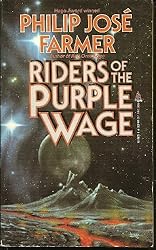
![]() Riders of the Purple Wage by Philip Jose Farmer
Riders of the Purple Wage by Philip Jose Farmer
At the risk of being overly simplistic, Jacque Derrida’s concept of deconstruction/post-structuralism (whichever you want to call it) is at heart the perspective that any ideological paradigm can be picked apart, bone by bone, until the skeleton lies in shambles on the floor. The purpose is not nihilistic in nature; it is intended, rather, to cast a wrench of relativity into such lofty ideals as modernism, and the rigid mindset of structuralism that came in tow. In practice, I have yet to read a science fiction text that deconstructs the Silver Age better than Philip Jose Farmer’s 1967 Riders of the Purple Wage. From its irreverent title to the telling conclusion, the bones are dust.
Anything but a modernist vision of man as hero among the stars in his gleaming space ship, Riders of the Purple Wage is a satirical vision of the future. Like Ray Bradbury’s Fahrenheit 451, Farmer creates a futuristic setting to comment upon contemporary issues. But, where the life of Guy Montag is described in terms the reader can easily access, Farmer places a blackly sardonic spin on the narrative, the mood and imagery becoming surreal. And the surreal is seen lexically, as well. Written in irreverent prose that boils and bubbles into some of the most bizarre, dense, and oddball usage of language, the story of Chibiabos Elgreco Winnegan is an obtuse dystopian stone skipping in Alice in Wonderland waters.
Civilization having evolved to the point that resources are plentiful and well-distributed, people in Chib’s world are given money for doing nothing and are left to spend it as they will — their name for this form of welfare is the titular purple wage. As complacent as can be, people are overweight, bask in sex and sex toys, sit in front of the fido (tv-radio) all day, and, in general, revert to simple pleasures in a wasting lifestyle. With so much time on hand, there is a flowering of the arts in all sorts of bizarre directions as well, and in following, an even larger number of critics and theories of more bizarre conception. Chib, a 3D painter, spends his days in light rebellion of government, investing ‘vitriol’ in his art. Needing government sanction to continue working as an artist, however, puts him in a place of need, and an upcoming exhibition is to be his proving grounds. How the exhibition turns out, however, may have more to do with the exigencies of social and home life brought by the purple wage.
Extremely dense, convoluted prose (satire on prose itself, it seems at times), Riders of the Purple Wage utilizes the idea of ‘purple’ in a few ways. Word play, puns, and phrasing that is poetic, experimental, and intentionally disassociating abound. Purple to some, experimental to others, the use of language is, to say the very least, facile. As unpredictable lyrically as the weather, wonderful lines such as:
Grandpa laughs deeply, a lion’s roar with a spray of doves
are balanced by such opaque, poetically overburdened lines as:
It grows out and out until weight and length merge to curve it over, a not-yet weeping willow or broken reed. The one-eyed red head peeks over the edge of bed. It rests its chinless jaw, then, as body swells, slides over and down. Looking monocularly this way and those, it sniffs archaically across the floor and heads for the door, left open by the lapsus linguae of malingering sentinels.
But it can also be as fun and clever as:
He speaks, thinks, lives in the present tensely.
But I digress, and will suffice at saying the reader should know whether they enjoy reading highly atypical prose or not, and let that be the main criteria on which they decide whether or not to read this story.
In the end, Riders of the Purple Wage is, and will always be, one of the most unique texts the genre has to offer, and for this will be extremely divisive. If you are not interested in science fiction as literature and prefer narratives of the writers Farmer is indirectly commenting upon (Burroughs, Heinlein, Asimov, and in today’s context, Reynolds, Willis, Scalzi, et al.), then you should probably skip this one. Yes, it won a Hugo award, but it was at a time when the organizers and voters were a more tightly focused group aware of the genre’s place in literature and culture rather than the overblown popularity contest that is today’s farce — I mean award. Knowing deep down its place in time and the genre, the novella is one of the major highlights of the American New Wave science fiction movement and a driving force behind the success of Harlan Ellison’s classic Dangerous Visions anthology. Certainly other New Wave writers owe something to Farmer’s ovoid fornixation vision of pop art and its vaudeville portrayal critics in a Wall-eworld. Linguistically something to dig in and chew on, it fulfills an ideal of Derrida, leaving the standard Silver Age science fiction narrative in shambles.



Do it! One of the best things I've read in recent years.
This reminds me. I want to read Addie LaRue.
We’re in total agreement David!
I felt just the same. The prose and character work was excellent. The larger story was unsatisfying, especially compared to…
Hmmm. I think I'll pass.